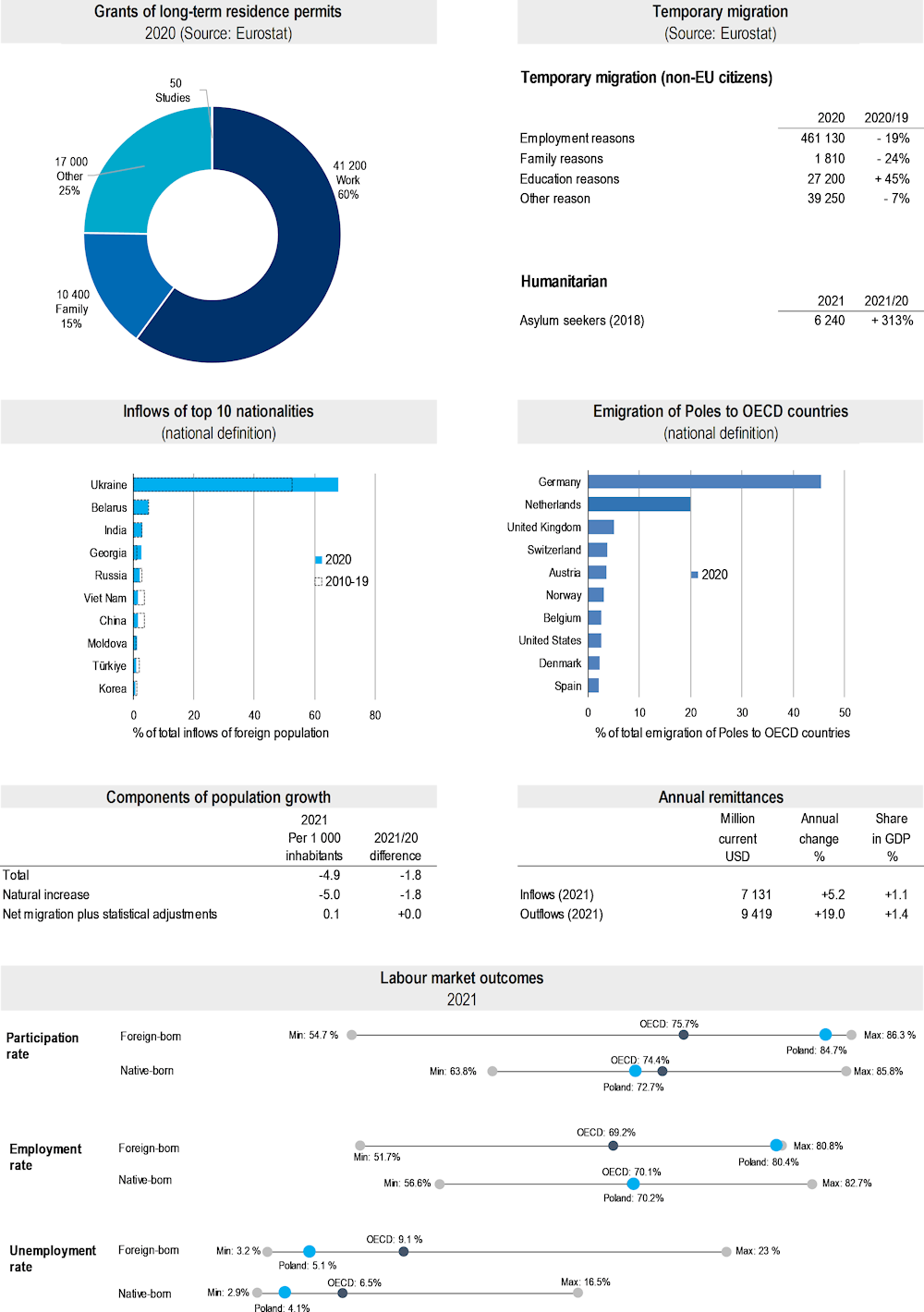In 2020, 69 000 new immigrants obtained a residence permit longer than 12 months in Poland (excluding EU citizens), ‑26.1% compared to 2019. This figure comprises 60% labour migrants, 15.2% family members (including accompanying family), 0.1% who came for education reasons and 24.7% other migrants. Around 27 000 short-term permits were issued to international students and 461 000 to temporary and seasonal labour migrants (excluding intra-EU migration). In addition, 59 000 intra-EU postings were recorded in 2020, a decrease of ‑37% compared to 2019. These posted workers are generally on short-term contracts.
Ukraine, Belarus and India were the top three nationalities of newcomers in 2020. Among the top 15 countries of origin, Ukraine registered the strongest increase (2 600) and Belarus the largest decrease (‑1 000) in flows to Poland compared to the previous year.
In 2021, the number of first asylum applicants increased by 310%, to reach around 6 200. The majority of applicants came from Belarus (2 100), Afghanistan (1 600) and Iraq (1 300). The largest increase since 2020 concerned nationals of Belarus (1 700) and the largest decrease nationals of Russia (‑150). Of the 3 610 decisions taken in 2021, 60% were positive.
In August 2021, the Department of Migration Analysis and Policy was merged with the Department of International Affairs into a new Department of International Affairs and Migration to improve co‑ordination in international, border and migration policy.
Due to the COVID‑19 pandemic, the validity of various types of residence permits, Schengen and national visas were automatically extended from March 2020, although this did not entitle to stay or travel to other Schengen countries.
In September 2020, the government launched a new programme and simplified visa procedure, “Poland. Business Harbour”, aimed at supporting ICT sector entrepreneurs from Belarus considering relocation to Poland. In July 2021, the programme was expanded to include Armenia, Georgia, Moldova, Russia, and Ukraine.
From December 2020, foreigners in Poland with a humanitarian or “Poland. Business Harbour” visa may be employed without a work permit. Exemption was also granted to medical professionals and private domestic staff of diplomats and consular officers. In November 2021, new rules entered into force which make it easier for doctors who have gained their professional qualifications in non-EU countries to practice in Poland. Foreign doctors can work under the simplified rules for a maximum of five years, under condition they confirm knowledge of the Polish language and have obtained a promise of employment from the future employer.
New rules on posting of workers, in force from September 2020, resulted from the implementation of EU Directive 2018/957/EU provisions into Polish law. The key change was to guarantee posted workers remuneration rights covering all components under labour law, not only a minimum wage.
On 29 January 2022, an amendment to the Act on Foreigners came into force, which aims to simplify and accelerate procedures for the employment of foreigners, prioritising salary level.
In October 2021, in response to the situation on the Polish-Belarusian border, the Foreigners Act and International Protection Act were amended. According to the new provisions, applications for international protection lodged by foreigners apprehended immediately after crossing illegally the external EU border may not to be examined unless they arrived directly from a territory, where their life or freedom was threatened and they presented credible reasons for illegal entry. New Article 303b in the Foreigners Act, provides that people illegally crossing the border may be issued an order to leave the territory and will be temporarily banned from entering Poland and the Schengen area. The entry ban included in the order will be issued for a period of six months to three years.
Art. 18c in the Act on Protection of the State Border, introduces a criminal provision with regard to destroying border infrastructure. A person who “takes away, destroys, damages, removes, moves or makes unusable elements of infrastructure, located in the border zone and intended for the protection of the state border, in particular fences, entanglements, barriers or turnpikes” will be subject to a punishment of six months to five years imprisonment. However, in the case of lesser gravity, the offender will be subject to a fine.
For further information: www.emn.gov.pl | www.udsc.gov.pl | www.stat.gov.pl | www.cudzoziemcy.gov.pl | www.fundusze.mswia.gov.pl

